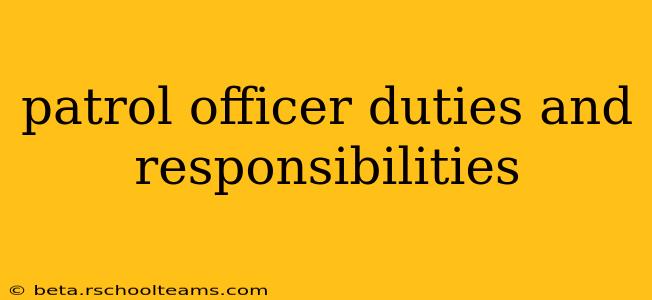Patrol officers are the backbone of law enforcement, the first responders to a wide range of incidents and the visible face of public safety. Their duties and responsibilities are multifaceted and demanding, requiring a unique blend of skills, training, and dedication. This comprehensive guide explores the core responsibilities of a patrol officer, addressing common questions and providing a detailed overview of this critical role.
What are the main duties of a patrol officer?
The main duties of a patrol officer revolve around maintaining order, enforcing laws, and providing assistance to the community. This includes responding to calls for service, conducting proactive patrols, investigating crimes, and making arrests. They are often the first point of contact for citizens needing help, requiring them to be adept at handling various situations, from minor traffic violations to serious emergencies. Specific tasks may vary based on location and department policies, but core functions typically include:
- Responding to calls for service: This is a primary function, encompassing a broad spectrum of incidents, from domestic disputes and traffic accidents to burglaries and assaults. Officers must assess situations quickly, take appropriate action, and document their findings meticulously.
- Conducting proactive patrols: Patrols are not just about responding to calls; they're about actively preventing crime. Officers patrol assigned areas, looking for suspicious activity, maintaining a visible presence to deter crime, and interacting with community members.
- Investigating crimes: Patrol officers often initiate investigations, collecting evidence, interviewing witnesses, and preparing reports. While more complex investigations might be handled by specialized units, patrol officers lay the groundwork for successful prosecutions.
- Making arrests: When necessary, patrol officers are authorized to arrest individuals who have violated the law. This requires careful judgment, knowledge of legal procedures, and the ability to de-escalate tense situations safely.
- Writing reports: Meticulous record-keeping is essential. Patrol officers spend a significant amount of time documenting their activities, including incident reports, arrest reports, and other official paperwork.
- Testifying in court: Officers may be required to testify in court about their observations and actions during incidents they responded to. This requires clear communication and the ability to withstand scrutiny under pressure.
What are the responsibilities of a patrol officer in different situations?
A patrol officer's responsibilities adapt to the specific situation. Let's explore a few examples:
Responding to a Domestic Dispute
In a domestic dispute, a patrol officer's responsibilities include assessing the situation for safety, separating involved parties, de-escalating tensions, providing mediation if possible, and potentially making arrests if the law has been broken. Detailed documentation of the incident and actions taken is critical.
Investigating a Traffic Accident
Investigating a traffic accident requires officers to secure the scene, assess injuries, collect evidence (such as witness statements and photos), determine fault, and complete accident reports.
Handling a Mental Health Crisis
Increasingly, patrol officers are the first responders to individuals experiencing a mental health crisis. This requires specialized training in crisis intervention techniques and the ability to work effectively with mental health professionals. The goal is to de-escalate the situation and ensure the individual receives appropriate care.
What skills are needed to be a patrol officer?
Beyond the core duties, a successful patrol officer needs a diverse skillset:
- Strong communication skills: Effective communication is paramount, whether interacting with citizens, fellow officers, or suspects.
- Critical thinking and problem-solving abilities: Officers must make quick, informed decisions in often stressful and ambiguous situations.
- Physical fitness and stamina: The job is physically demanding, requiring officers to be in excellent physical condition.
- Ability to work under pressure: Patrol officers routinely face high-stress situations, requiring composure and resilience.
- Knowledge of the law: A thorough understanding of laws and legal procedures is essential for making lawful arrests and conducting fair investigations.
- Adaptability and flexibility: Every day brings different challenges, requiring adaptability and the ability to adjust to changing circumstances.
What are the common challenges faced by patrol officers?
Patrol officers face numerous challenges, including:
- Exposure to dangerous situations: The work inherently involves risk, with officers encountering potentially violent or dangerous individuals and situations.
- Long and irregular hours: Shift work, overtime, and callouts are common, leading to irregular schedules and potential disruption to personal life.
- Emotional toll: Witnessing traumatic events and dealing with difficult situations can take a significant emotional toll.
- High levels of stress: The job demands constant vigilance and quick decision-making under pressure.
What is the difference between a patrol officer and a police officer?
The terms “patrol officer” and “police officer” are often used interchangeably. However, “patrol officer” specifically refers to officers assigned to patrol duties, whereas “police officer” is a broader term encompassing all ranks and roles within a police department. A patrol officer is a type of police officer.
This comprehensive guide highlights the crucial duties and responsibilities of a patrol officer. It’s a demanding yet rewarding career path for those committed to public service and possessing the necessary skills and dedication.
